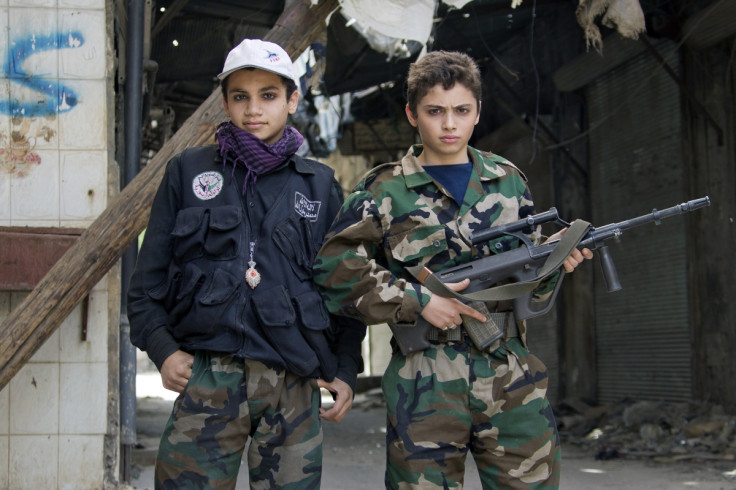Syria: Child Soldiers as Young as 15 'Thrown onto Front Lines' By Isis

Armed militias in Syria are using children as young as 15 on the front line, sometimes recruiting them under the pretence of providing free schooling, Human Rights Watch said in a report.
Extremist groups, including the Islamic State of Iraq and the Levant (Isis) which has overrun northern Iraq, have specifically recruited children with the promoise of free schooling that also include weapons training, and have given them dangerous tasks, including suicide bombing missions.
One former child soldier, Raed, said he attended training at 16 with around 300 others, many of whom were aged between 12 and 18.
"The leader of the camp said Isis like the younger ones better," Raed explained. "He told me: 'Tomorrow they'll be a stronger leader or a stronger fighter'."
The report, titled Maybe We Live and Maybe We Die, documents the experiences of 25 children and former child soliders in Syria's armed conflict. Human Rights Watch interviewed children who fought with the Free Syrian Army, the Islamic Front Coalition and the extremist groups Isis and Jabhat al-Nusra, an Al-Qaeda affiliate, as well as the military and police forces in Kurdish-controlled areas.
"Syrian armed groups shouldn't prey on vulnerable children – who have seen their relatives killed, schools shelled, and communities destroyed – by enlisting them in their forces," said author Priyanka Motaparthy. "The horrors of Syria's armed conflict are only made worse by throwing children into the front lines."
The number of children fighting with armed groups in Syria is not known. By June, the Violations Documenting Center, a Syrian monitoring group, had recorded 194 deaths of "non-civilian" male children in Syria since September 2011.
Children interviewed for the report said they had fought in battles, acted as snipers, manned checkpoints, spied on hostile forces, treated the wounded on battlefields and transported ammunication and supplies to the front lines during fighting.
Reasons for joining armed groups included following relatives and living in battle zones without schooling or other options, while others had participated in public protests that motivated them to do more. Some children said they had suffered at the hands of the government.
Saleh, 17, said he fought with the Free Syrian Army at 15 after he was detained and tortured by government security forces. "I thought of leaving the fighting a lot," he said. "I lost my studies, I lost my future, I lost everything."
Another boy, Majed, 16, said that Jabhat al-Nusra in Daraa recruited him and other boys in his community by providing free schooling at a local mosque that included military training and target practice.
While all those interviewed were boys, the Kurdish Democratic Union Party police force and the armed wing, the People's Protection Units, enlisted girls to guard checkpoints and conduct armed patrols in Kurdish-controlled areas.
The Optional Protocol to the Convention on the Rights of the Child, ratified by Syria in 2003, bans government forces and non-state armed groups from recruiting and using under 18s as fighters.
© Copyright IBTimes 2024. All rights reserved.






